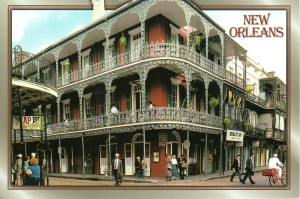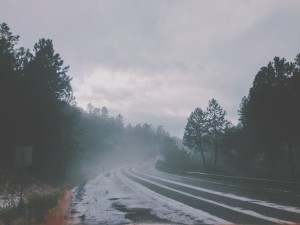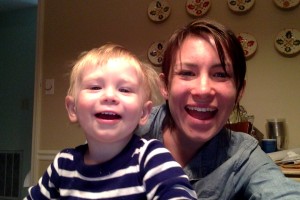It’s always the same, coming home from a vacation–that last block before our house.
We drive up the hill, and turn under a canopy of locust trees. On our left, there’s the big rhododendron bush, the vacant duplex with the colorful window frames, two red brick rentals, and grass. On the right, there’s trash tucked into the undergrowth, and sometimes a neighborhood deer, nosing through a discarded fast food bag.
“Boo!” I might say to the deer. And if the leftovers aren’t that fascinating, the deer might even look up. City deer are never afraid; I could yell, “We’ve been away! For weeks. We were really far away. Didn’t you miss us?”
And if deer could roll their big doe eyes, she just might. But instead we drive on, pulling up in front of our house.
Home! Finally, we’re home. But how can coming home feel so familiar and so surreal, all at the same time?
* * * * *
Several years ago we made the adventurous (or foolish) decision to drive to New Orleans with a three and a five year old. There and back again, with overnights at a friends’ house in Charlotte and a cabin in the northeastern Alabama woods, it was about thirty-five hours of driving.
And after thirty-five hours of the Veggie-Tales CD, let me tell you, we were ready to come home. But as we drove that familiar last block (no deer that night), waved to our neighbors, and greeted our black cat, something wasn’t quite right.
It was as if we had never left. But we had. After two weeks and two thousand miles, our eyes were now accustomed to new sights and unfamiliar places. I felt uneasy in the old and familiar.
Strange.
But there wasn’t much time for reflection. Instead, there were tasks–get the girls in bed, empty the cooler, take off the bikes. Home quickly became a to-do list. Our room was the aftermath of our two-weeks-previous packing tornado. The girls room was worse. A Goodwill trip, perhaps a dumpster, was in order. I suddenly became nostalgic about living out of suitcases.
It was home. It was really overwhelming.
 Time had passed, things had changed, but the same skirt that I had rejected while packing was still sitting on my bed. I regarded it as a foreign object–the North Carolina mountains seemed nearer. Was it only a week ago that I biked the streets of New Orleans? And that lovely cabin in Alabama… I could almost smell the pine trees. Were all of these places and moments just postcards and photographs now?
Time had passed, things had changed, but the same skirt that I had rejected while packing was still sitting on my bed. I regarded it as a foreign object–the North Carolina mountains seemed nearer. Was it only a week ago that I biked the streets of New Orleans? And that lovely cabin in Alabama… I could almost smell the pine trees. Were all of these places and moments just postcards and photographs now?
I threw the skirt off the bed and lay down.
* * * * *
The next morning I had some coffee in the backyard. The chickens were doing their chicken-y things in the run, the kids were swinging under the magnolia tree, and the sun was shining through everything green.
It was good to be home.
Eventually I slowed down enough to remember one of my favorite quotes. From G.K. Chesterton. The words rippled through my head as I sipped from my warm mug, stilling me.
The fatal metaphor of progress, which means leaving things behind us, has utterly obscured the real idea of growth, which means leaving things inside us.
Ah… here was a key. I took another sip.
The thing about coming home is that it is work. Good work. But it is not only the work of unpacking, laundry and trying to find the darn cellphone charger. It’s not just returning to my email inbox, catching up at the office, or purging excess stuff. Coming home is also the work of figuring out what my experiences of far-away places will mean in my close-to-home places.
Coming home is allowing myself to be different than I was, and giving the left-inside things room to grow. And as I sat there, under the same magnolia tree, surrounded by the same neighbors and the same city deer, gearing up to clean my room, I sighed and smiled.
“There’d better be some new things in there,” I thought, laying a hand on my breastbone as if I might feel something move. “Two thousand miles is a long was to go for some postcards.”
Postcard picture by Else-Marla Tennessen

 “Winter Road” was written by Michael Hadley. Most of Michael’s time has been spent migrating between Chattanooga, TN for college and Asheville, NC where his parents live. For a semester he lived between the communications department, Starbucks, and Barnes and Noble; his addiction to books and coffee is what drives him. Currently he is freelancing in Asheville, NC and Chattanooga, TN hoping to find a “real” job. His work can be found at
“Winter Road” was written by Michael Hadley. Most of Michael’s time has been spent migrating between Chattanooga, TN for college and Asheville, NC where his parents live. For a semester he lived between the communications department, Starbucks, and Barnes and Noble; his addiction to books and coffee is what drives him. Currently he is freelancing in Asheville, NC and Chattanooga, TN hoping to find a “real” job. His work can be found at 
